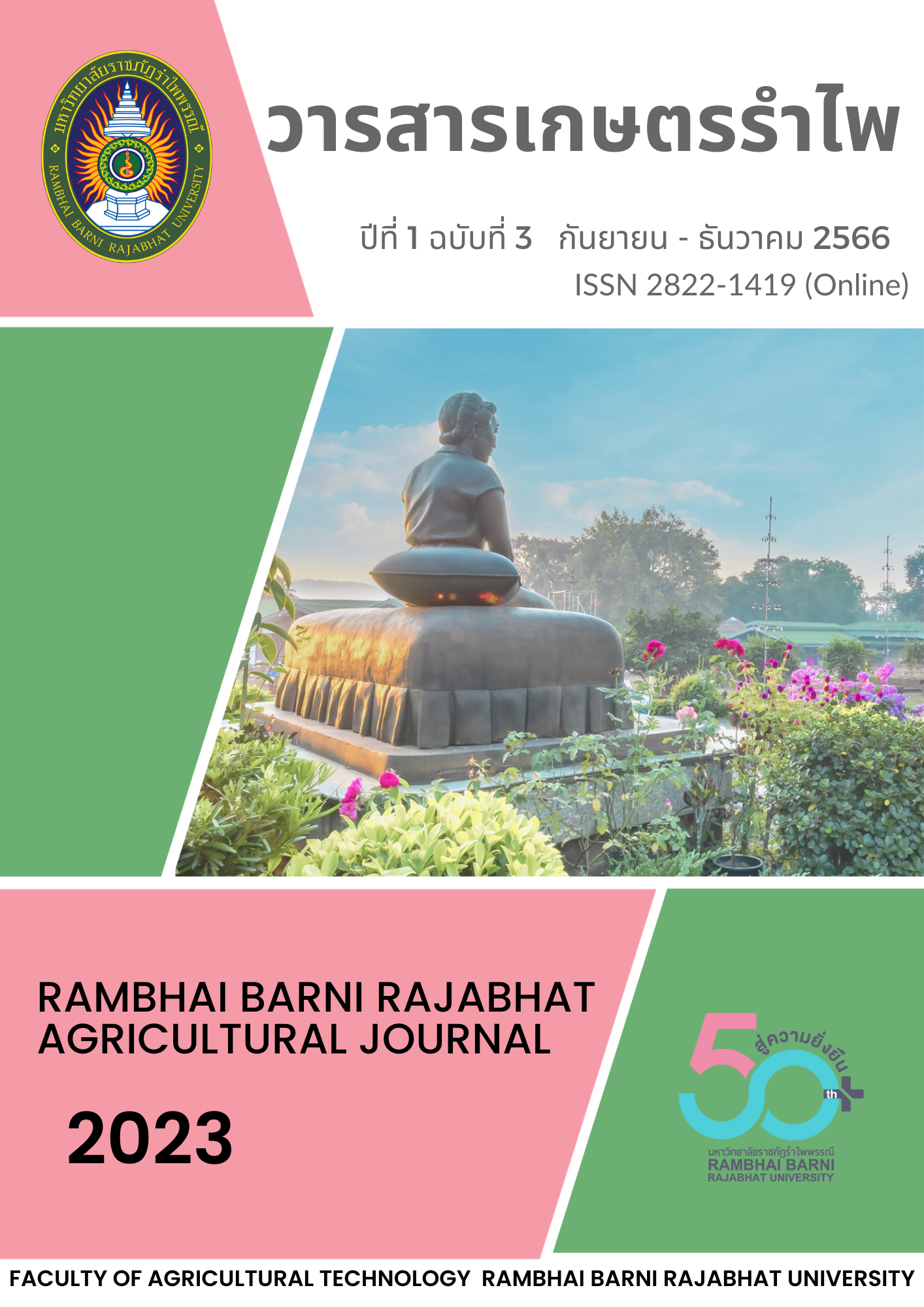Application of Water-soluble 16-16-16 Granular Fertilizer on Different Cropping Systems for the Growth of Pak Choi (Brassica chinensis var. parachinensis)
Main Article Content
Abstract
This study aimed to determine the application of 3 different cropping systems consistsing of soil, substrate, and hydroponics using water-soluble 16-16-16 granular fertilizer on the growth of pak choi (Brassica chinensis var. parachinensis). The experiment was designed in a Completely Randomized Design (CRD) with 4 treatments 3 replications with 20 plants each, consisted of two phases : the first, from September to October, used green pak choi; the second, from December to January, used Hongte pak choi. In Phase 1, from the beginning of the crop (30 days) to the end of the experiment (45 days), it was found that the soil-planting method had the greatest effect on the number of leaves, leaf size, height and fresh weight of green pak choi, with a leaf number of 9.4, a leaf size of 14.87 cm, a plant height of 17.8 cm, and a weight of 133.8 g per plant, followed by substrate and then hydroponics systems. In Phase 2 using Hongte pak choi it was demonstrated that the soil-planting method yielded similar results for plant growth to those of Phase 1 number of leaves, leaf size, height and fresh weight. Slimilar results were found substrate and hydroponics, with fresh weights of 41.8 g and 5.4 g per plant, respectively. In this experiment applying water-soluble 16-16-16 granular fertilizer on the growth of pak choi (Brassica chinensis L.), soil cultivation was found to be the most suitable method in promoting the growth of both green and Hongte varieties of pak choi.
Article Details

This work is licensed under a Creative Commons Attribution-NonCommercial-NoDerivatives 4.0 International License.
References
ขนิษฐา ฤกษ์อรุณ และพรไพรินทร์ รุ่งเจริญทอง. (2556). ผลของปุ๋ยเคมีที่แตกต่างกันต่อการเจริญเติบโต ผลผลิต และประสิทธิภาพการใช้ปุ๋ยของกวางตุ้ง. ในการประชุมวิชาการแห่งชาติ ครั้งที่ 10 วันที่ 6–7 ธันวาคม 2556 (หน้า 2181-2186). นครปฐม : มหาวิทยาลัยเกษตรศาสตร์ วิทยาเขตกำแพงแสน.
นาวิน สุขเลิศ, จีราพร กุลสาริน, ไสว บรูณาพานิพันธุ์ และวีรเทพ พงษ์ประเสริฐ. (2559). ประสิทธิภาพของสารชีวภัณฑ์เชื้อรากําจัดแมลงในการควบคุมด้วงหมัดผักแถบลายในเบบี้ฮ่องเต้บนพื้นที่สูงของจังหวัดเชียงใหม่. วารสารเกษตร, 32(2) :171-180.
นุชนารถ ตั้งจิตสมคิด และสาโรจน์ ประชาศรัยสรเดช. (2547). การใช้ไส้เดือนฝอยก่อโรคแก่แมลงสายพันธุ์ไทยกําจัดแมลงศัตรูผักคะน้า. วารสารวิชาการเกษตร, 22(2) : 145-156.
เบญจพร ชำนาญ, ขวัญฤดี สุวะไกร, ทิพย์สุคน อนุภาพ, ทัศนีย์ แจ่มจรรยา, นุชรีย์ ศิริ, ยุวธิดา ศรีพลแท่น, อุบล ตังควานิช และ ประกายจันทร์ นิ่มกิ่งรัตน์. (2565). การใช้ชีวภัณฑ์ในการควบคุมด้วงหมัดผักแถบลาย (Phyllotreta sinauta Stephen) (Coleoptera: Chrysomelidae) ในกวางตุ้ง. วารสารแก่นเกษตร, 50(4) : 932-944.
สํานักงานเศรษฐกิจการเกษตร. (2555). สถิติการค้าสินค้าเกษตรไทยกับต่างประเทศ ปี 2554. ศูนย์สารสนเทศ สำนักงานเศรษฐกิจการเกษตร กระทรวงเกษตรและสหกรณ์.
สิรินาฏ พรศิริประทาน. (2554). การส่งออกผักและผลไม้สดไทยไปสหภาพยุโรป. ส่วนงานสารสนเทศและเผยแพร่วิชาการ สถาบันระหว่างประเทศเพื่อการค้าและการพัฒนา (องค์การมหาชน).
Asaduzzaman, M., Saifullah, M., Mollick, A.S.R., Hossain, M.M., Halim, G. and Asao, T. (2015). Influence of soilless culture substrate on improvement of yield and produce quality of horticultural crops. In Asaduzzaman, M.D., Editor. Soilless Culture - Use of substrates for the production of quality horticultural Crops. (pp. 25-34) New Delhi : IntechOpen.
Gobilik, J., Rechard, C.T., Maludin, A.J., Alam, M.A.A. and Benedick, S. (2021). Efficacy of column hydroponic system for increasing growth and yield of pak choy (Brassica rapa l.) per unit area. Transaction on Science and Technology, 8(1) : 1-7.
Hooks, T., Sun, L., Kong, Y., Masabni, J. and Niu, G. (2022). Effect of nutrient solution cooling in summer and heating in winter on the performance of baby leafy vegetables in deep-water hydroponic systems. Horticulturae, 8 : 749-765.
Liu, W., Li, S. and Chen, D. (2003). Effect of organic nutrient solution on growth and quality of pak choi under soilless culture. Acta Horticulturae, 627 : 139-144.
Pant, A.P., Radovich, T.J.K., Hue, N.V. and Miyasaka, S.C. (2012). Pak Choi (Brassica rapa, Chinensis Group) yield, phytonutrient content, and soil biological properties as affected by vermicompost-to-water ratio used for extraction. HortScience, 47(3) : 395-402.
Silitonga, M., Sipayung, P., Sitorus, I.M., Siahaan, R., Hutauruk, S., Fajar, T.S.A., Sarumaha, S.R.D. and Panijaitan, D. (2018). The effect of biochar dose and NPK fertilizer on the production and growth of pak choi plant. International Conference on Agribussines, Earth and Environmental Science, 205 : 1-8.
Song, S.W., Liao, G.X., Liu, H.C., Sun, G.W. and Chen, R.Y. (2012). Effect of ammonium and nitrate rations on growth and yield of Chinese kale. Applied Mechanics and Materials, 142 : 32-36.
Tripathi, K.M., Dhakal, D., Sah, S., Baral, D.R. and Sharma, M.D. (2018). Evaluation of vermicompost and chemical fertilizers on performance of pak choi (Brassica rapa cv. Hong Tae) and soil biological process. Journal of the Institute of Agriculture and Animal Science, 33 : 243-250.
Wiangsamut B. and Koolpluksee M. (2020). Yield and growth of pak choi and green oak vegetables grown in substrate plots and hydroponic systems with different plant spacing. International Journal of Agricultural Technology, 16(4) : 1063-1076.


